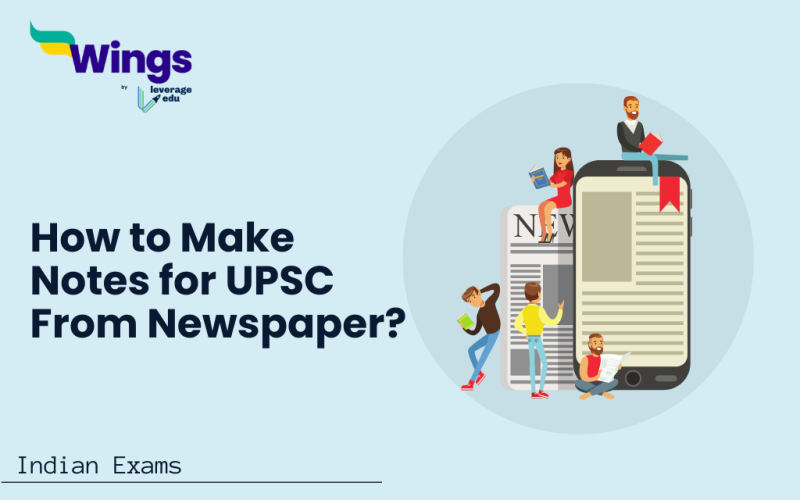Before beginning to prepare for the UPSC Current Affairs portion through a Newspaper like Hindu, it is advisable to be well-versed in the UPSC syllabus and the IAS exam pattern. It will take a newbie with limited knowledge of the UPSC syllabus and pattern a long time to read and become ready for the newspapers.
UPSC exam aspirants can select important issues from the newspaper and omit irrelevant ones by carefully reviewing the syllabus and previous year’s questions. In this manner, the candidate will spend less time reading the newspapers and will know exactly which articles to read and which ones to ignore.
If you are still wondering How to Make Notes for UPSC From Newspaper? No need to worry anymore. You are in the right place. Read this article to clear your doubts.
Making Notes from Newspaper for UPSC
How to take relevant notes from a newspaper for UPSC is the question. For current affairs, concise notes must be prepared. In UPSC preparation, less is always more, as the saying goes. Making notes is a skill that is developed over time. It is an art. Notes should be easy to read, efficient, and crisp.
Different people may prepare their notes for the IAS exam in different ways. Below are two approaches that are mentioned:
- Some candidates would rather keep a special book, register, or set of sheets or flip cards and arrange them according to months, themes, and topics.
- As this is the dynamic section of the syllabus, some people find it easier to classify, amend, and add notes when they take notes online. For current affairs, using the internet is unavoidable, and using this way makes it simpler to update straight from the internet. Aspirants can utilize Evernote notebooks and organize them according to topics and subjects.
| Aspect | Digital Notes from Newspapers | Physical Notes from Newspapers |
| Pros | Portability & Accessibility | Tangible experience |
| Interactive multimedia content | No reliance on technology | |
| Cost-effective subscriptions | Eye comfort, less strain | |
| Cons | Screen fatigue | Less portable |
| Digital distractions | Limited storage space | |
| Limited access without internet | Inconvenient for travel |
Each of the note-taking methods discussed above has advantages and disadvantages. It is up to each person to determine which approach is most effective for them.

| How to Prepare for UPSC 2024 at Home? | Backup Plan for UPSC Aspirants |
| UPSC Previous Year Question Papers For the Last 10 Years | UPSC Book List |
| How Many Questions are there in UPSC Mains? | UPSC Preparation for Working People |
Guidelines for Creating Notes From Newspapers
There are some guidelines for creating useful notes for the UPSC from newspapers:
- Editorials, defence news, economics, constitutional amendments, environment, government laws and plans, international affairs, social issues, judicial decisions, etc. should be the main areas of concentration.
- Ignore the majority of sports news, hyperlocal news, celebrity-related news, and just political news.
- Write notes using your language. Emphasise, highlight, and add information from reliable sources such as PIB, Yojana, and PRS.
- It is expected of an aspirant to jot down summaries of significant articles and concerns. Preserve the article’s core ideas; jot down the theme, supporting details, arguments, advantages, ramifications, etc.
- To have a thorough knowledge, one must learn how to link dynamic and static information. A student must comprehend the significance of a judgement by connecting it to geography, politics, or economics.
- Develop the practice of writing down the problems and social concerns that our society is facing. The same might be cited by candidates in UPSC GS or essay papers to support their arguments. When understanding this, make sure to include all the relevant details, advantages, and disadvantages, as well as any recent occurrences.
- Editorials are very significant since they offer analysis on a wide range of topics. Opinions in editorials can be biased. However, it is required of a UPSC candidate to include arguments both in favor of and against the subject. This helps in developing a viewpoint, which must be impartial.
Many students who peruse the newspapers do not simplify the procedure of taking notes. This is problematic because the UPSC exam frequently includes both static and dynamic content in its questions. Please use the section below to learn more about UPSC preparation.
How to Read The Hindu?
One of the most frequent queries among candidates getting ready for the Civil Services Exam is “How to read The Hindu?” Because The Hindu covers a wide range of topics that are frequently found in the exam, it is a highly recommended preparation resource.
In recent years, current events have grown in importance as a component of the Civil Services Exam. Thus, it is very important to address current issues from a comprehensive perspective. Candidates who follow this thorough strategy can perform well on both the preliminary and major exams. Here in this section, we have divided the exam-specific strategy into various exam phases so as to answer “How to Make Notes for UPSC From Newspaper?” :
Prelims:
- Subdivide topics into specific areas such as Economics, Environment, Space, Defence, etc.
- Create exhaustive lists of sub-topics under each category.
- Organize notes using tools like Microsoft Word or Google Docs.
- Focus on jotting keywords, data, important organizations, and judgments.
- Supplement news with additional research to anticipate UPSC questions.
- Example: Automobile sector news categorized under “Economy — Recession” with relevant keywords and data.
Mains:
- Create separate notes for GS 2 and GS 3 topics.
- Further breakdown of major topics into sub-topics for detailed coverage.
- Include major happenings, legislations, policies, court decisions, commission reports, etc.
- Conduct brief research to include relevant legislation, white papers, etc.
- Example: Security challenges and management in border areas broken down into Indo-Pakistan, Indo-Myanmar, and Indo-Bangladesh borders, and linkages of organized crime with terrorism.
Essay Notes:
- Cover various topics and trends like agriculture, primary education, technology, etc.
- Include quotations and major data from reports related to these topics.
- Compile major reports’ names for reference.
- These notes facilitate efficient revision and enhance essay scores.
Adopting this systematic approach to note-making from newspapers like The Hindu can significantly aid UPSC aspirants in their preparation.
RELATED POSTS
This was all about the “How to Make Notes for UPSC From Newspaper?”. For more such informative blogs, check out our UPSC Exams Section, or you can learn more about us by visiting our Indian exams page.


 One app for all your study abroad needs
One app for all your study abroad needs












 60,000+ students trusted us with their dreams. Take the first step today!
60,000+ students trusted us with their dreams. Take the first step today!